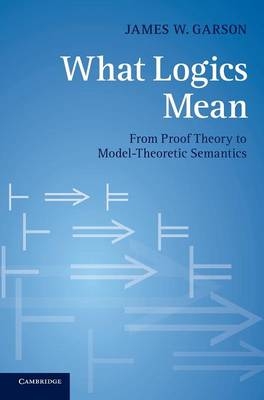
What Logics Mean
From Proof Theory to Model-Theoretic Semantics
Seiten
2013
Cambridge University Press (Verlag)
978-1-107-03910-0 (ISBN)
Cambridge University Press (Verlag)
978-1-107-03910-0 (ISBN)
Garson explores meta-questions about what logic does or should do, examining parts of language, especially connectives such as 'and' or 'if'. The book will be valuable for graduates and specialists in logic, philosophy of logic, and philosophy of language.
What do the rules of logic say about the meanings of the symbols they govern? In this book, James W. Garson examines the inferential behaviour of logical connectives (such as 'and', 'or', 'not' and 'if … then'), whose behaviour is defined by strict rules, and proves definitive results concerning exactly what those rules express about connective truth conditions. He explores the ways in which, depending on circumstances, a system of rules may provide no interpretation of a connective at all, or the interpretation we ordinarily expect for it, or an unfamiliar or novel interpretation. He also shows how the novel interpretations thus generated may be used to help analyse philosophical problems such as vagueness and the open future. His book will be valuable for graduates and specialists in logic, philosophy of logic, and philosophy of language.
What do the rules of logic say about the meanings of the symbols they govern? In this book, James W. Garson examines the inferential behaviour of logical connectives (such as 'and', 'or', 'not' and 'if … then'), whose behaviour is defined by strict rules, and proves definitive results concerning exactly what those rules express about connective truth conditions. He explores the ways in which, depending on circumstances, a system of rules may provide no interpretation of a connective at all, or the interpretation we ordinarily expect for it, or an unfamiliar or novel interpretation. He also shows how the novel interpretations thus generated may be used to help analyse philosophical problems such as vagueness and the open future. His book will be valuable for graduates and specialists in logic, philosophy of logic, and philosophy of language.
James W. Garson is Professor of Philosophy at the University of Houston. He is the author of Modal Logic for Philosophers, 2nd edition (Cambridge University Press, 2013).
Preface; 1. Introduction to model-theoretic inferentialism; 2. Deductive expression; 3. Local expression; 4. Global expression; 5. Intuitionistic semantics; 6. Conditionals; 7. Disjunction; 8. Negation; 9. Supervaluations and natural semantics; 10. Natural semantics for an open future; 11. The expressive power of sequent calculi; 12. Soundness and completeness for natural semantics; 13. Connections with proof-theoretic semantics; 14. Quantifiers; 15. Natural semantics and vagueness; 16. Modal logic; Summary.
| Erscheint lt. Verlag | 14.11.2013 |
|---|---|
| Verlagsort | Cambridge |
| Sprache | englisch |
| Maße | 170 x 244 mm |
| Gewicht | 700 g |
| Themenwelt | Geisteswissenschaften ► Philosophie ► Logik |
| Geisteswissenschaften ► Philosophie ► Sprachphilosophie | |
| Geisteswissenschaften ► Sprach- / Literaturwissenschaft ► Sprachwissenschaft | |
| ISBN-10 | 1-107-03910-X / 110703910X |
| ISBN-13 | 978-1-107-03910-0 / 9781107039100 |
| Zustand | Neuware |
| Informationen gemäß Produktsicherheitsverordnung (GPSR) | |
| Haben Sie eine Frage zum Produkt? |
Mehr entdecken
aus dem Bereich
aus dem Bereich
ein Gegenentwurf zum kurzfristigen Denken : so werden wir zu den …
Buch | Hardcover (2023)
REDLINE (Verlag)
CHF 27,90


